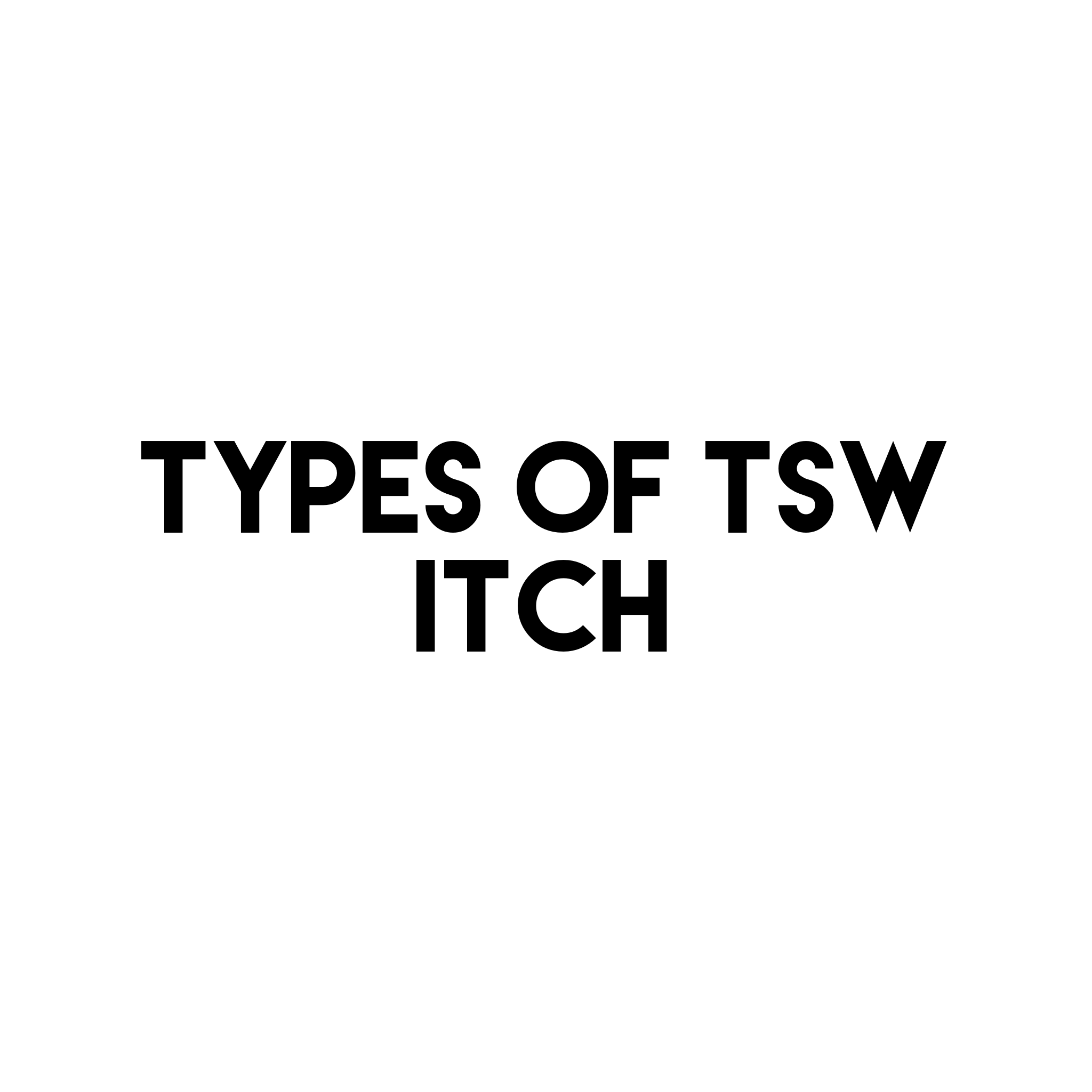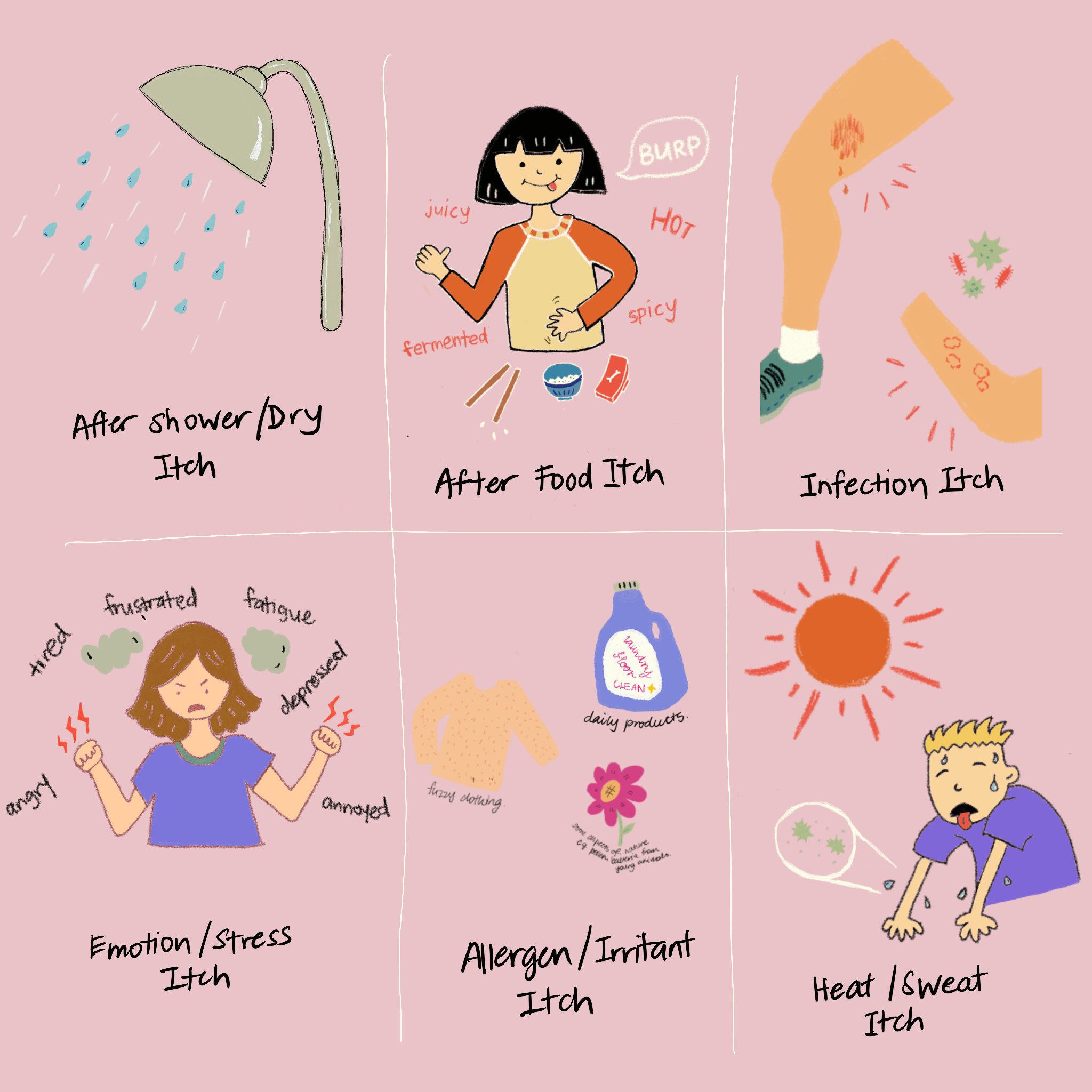Types of TSW Itch
Why do we itch?
Itch (or pruritus) is a general sensation that arises when the skin and the nerve cells are irritated. There is always a stimulus causing itch. Learning the triggers of your itch helps you manage it better and prevent further itch attacks.
Types of TSW itch:
After shower / Dry itch
After shower itch happens for 2 reasons: A) The natural oils on the skin are stripped off during the shower, leaving the skin dry. Dryness makes the skin itch. B) The skin is inflammed from being irritated by shower products
Tips:
A) Take short showers with cool water. Warm/hot water dissolves oil more effectively, stripping off natural oils faster and leaving the skin dryer
B) Use minimal or no products during shower. Plain water is enough!After food itch
A) Eating food requires the body to heat up in order to digest food. Heat naturally causes some irritation to the skin. Thus, the skin feels warm, itchy and irritated when having a meal. This applies to any/all kinds of food.
B) Spicy and hot/warm food naturally cause more heat and thus more irritation.
C) Sauces/gravy/juice touching the sides of your mouth can irritate the skin, particularly if they are acidic in nature
Tips:
A) Eat smaller, lighter meals
B) Avoid spicy food, cool your food down before eating, and avoid any steam coming off your food from contacting your face.
C) It is best to avoid barbeque pits, hotpot restaurants and anywhere that has a strong scent of food in the air. If you can smell it, it also means that the particles in the air can affect your skin.
D) Wipe your mouth regularly and avoid food from contacting your mouth/face as much as possible.
3. Bacteria/fungal infection itch
Infections are particularly itchy. It is important not to scratch when you have an infection, as the infection can spread rapidly through scratching.
Tips: Consult your doctor as soon as you suspect an infection. Take antibiotics or apply antibiotic cream if it is a bacteria infection, and anti-fungal medication/creams if it is fungal.
4. Emotion / Stress itch
Stress and emotion are huge triggers that cause flare ups. Common emotions that make us itch are frustration, annoyance, anger, fatigue/tiredness, disgust and fear.
Tips:
A) First manage the emotion: bring yourself to a quiet place, leave the triggering situation, drink a glass of water, count your fingers, ground and center yourself with music, rest and lie down if you are fatigued etc. Do whatever you need to feel calm.
B) After calming yourself, calm your skin. If your skin is able to take moisture, wet your hands and pat your skin gently. Feel the cool water and let it relax. If your skin is unable to take moisture, simply pat it gently.
C) If you are unable to touch your skin at all, speak to it. Tell it your emotions, then say sorry for taking your emotions out on it, affirm it that it will heal again. Thank it for protecting you and always healing up.
5. Allergen / Irritant itch
When foreign particles land on the skin, the skin detects it and protects itself. Sometimes these foreign particles are harmful, and sometimes they are harmless. Anything touching your skin can be stimuli that causes it. For example, fuzzy clothing or even a strand of hair that is tickling your skin, causing a general sensation of itch. The brain sends signals to your hand to scratch, thereby removing the foreign object (your hair/fuzzy material).
Since TSW is so sensitive and thin, almost anything on your skin can be “harmful” and cause a reaction. Simply the wind blowing in your direction and landing dust particles on your skin can cause red blotchy patches and itch.
Tips:
A) When you detect irritation occurring, quickly pop to the washroom and rinse the affected area to remove the stimuli
B) Let your skin calm down and heal
C) If possible, recognise the stimuli and avoid it in future
6. Heat / Sweat itch
A) Heat in general causes irritation to the skin.
B) Sweat itself does not irritate the skin. However, sweat is wet and sticky, so particles in the air attach to the skin easily when there is sweat on it. Sweat also makes existing irritant/allergen particles on the skin to sink in/be absorbed into the skin, causing irritation.
pull
Tips:
A) Carry an umbrella wherever you go to avoid direct sunlight from heating your skin up
B) Ensure your skin is clean before beginning any exercise
C) Wipe off/rinse off sweat as quickly as you can
7. Before bedtime / Night itch
A) The body prepares for sleep during the evening by letting our core body temperature drop. As a result, we feel warmer as night and our surface skin temperature rises. This heat causes itch
B) Your body is preparing for healing so metabolism rises, heating up your body and thus your skin. You will experience night sweats more intensely if your body is fighting an infection.
C) Skin renewal, natural exfoliation and differentiation during the night are a natural part of the circadian rhythm. These processes require a certain level of vulnerability of the skin e.g. the epidermis has to be more loosely packed for cellular movement to take place, therefore the body prefers to do it at night when we are less active and UV levels are lower. This increased looseness of the epidermal layer results in slight increases of TEWL, making the skin more dry and susceptible to irritation
D) Monthly period: Night sweats before and/or during your period are a common occurrence
8. Healing itch
Our favourite of all, healing itch. When the skin heals, the skin cells proliferate and pull the skin together to close and tighten wounds. This action stimulates nerve cells and causes itch. know it is healing itch when the skin is simply itchy and flaky but not red or inflamed.
In summary:
Itch is a protective mechanism. It informs our body of stimuli affecting the skin and allows our body to take care of it/remove it. Identifying the cause of your itch helps you manage better and avoid future itch attacks!

